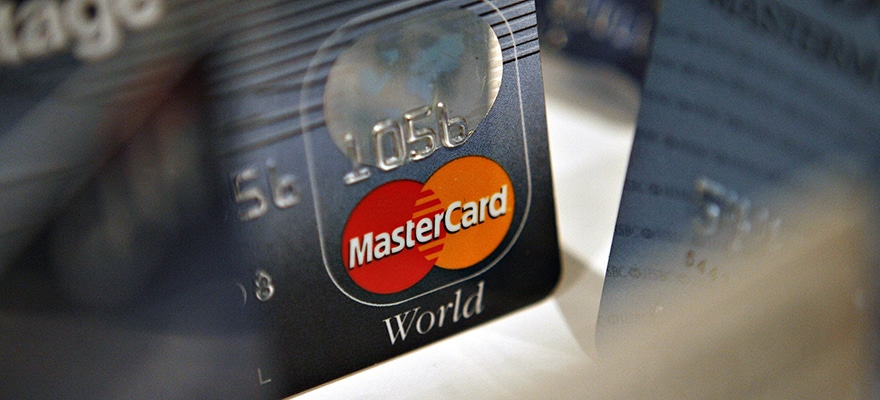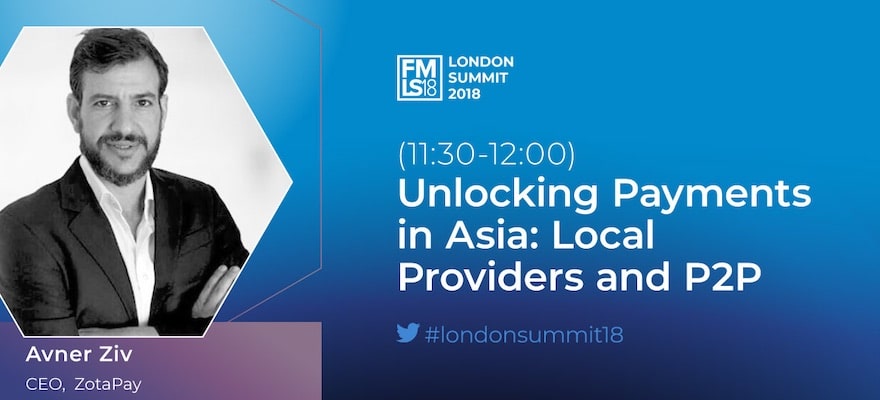The London Summit 2018 will kick off in just one week, with Finance Magnates rounding out its interview series of leading executives and speakers. The latest piece will focus on the dynamic world of Payments , including the recent seismic changes by Visa and MasterCard, namely their impact on ICOs and Cryptocurrencies , which have roiled the industry. Are you looking to better understand the past, present, or future playing field of PSPs and the overall industry? ZotaPay's CEO Avner Ziv touches on a number of key points and the trajectory of the payments industry as it relates to cryptocurrencies, China, and upcoming headwinds.
We recently reported that MasterCard and Visa would soon restrict payment processing for ICOs and crypto firms. Can you elaborate on the situation as you know it?
Visa and MasterCard card schemes have recently implemented changes which restrict payment processing of ICO’s and crypto firms. However, it is not only crypto related activities that are being affected but also the FX arena that is taking a hit. In addition to ICO and crypto merchants, FX brokers holding offshore licensed entities can no longer enjoy premium merchant accounts with European acquiring banks utilizing Visa and MasterCard processing even though they have both EU and non-EU regulations under their group structure.

Photo: Bloomberg
These changes pose major issues for acquiring banks who are forced to deal with the backlash of the new policies and requirements for merchants to be able to process Visa and MC card schemes, including a Legal Opinion from the local authority for each targeted region. Most of the banks are struggling to facilitate these new requirements and support their merchants, and as a result, many cases end in account termination. As the main point of contact between our merchants and the processors themselves, ZotaPay has a front row seat to witness this situation.
If indeed all products of crypto investment fall under High-Risk definitions in the credit cards’ view, what are the implications for the industry and what alternatives are out there?
The industry as a whole, including FX, CFD, Crypto and even binaries which has most recently collapsed, is High Risk by definition. It has been labeled as such due of the nature of markets, ticket sizes, amount of fraudulent activity and fraud to sale ratio, instability and dynamic within the regulatory environment. As a result, Visa and MC increased the time frame a user is given to claim a chargeback from 180 to more than 500 days! Putting aside the fact that the card schemes are not in favor of the crypto vertical, it is also a very risky model for the merchant who faces most of the risk exposure. When a transaction is performed, the token of a certain ICO or exchange is sent to the user. However, the end user still has the ability to chargeback. In this case, the merchant already provided the token and now faces a negative balance with the acquiring bank who has deducted the chargeback amount plus additional associated fees. The nature of crypto currency transfer was initially created to be hassle-free and anonymous with very small transaction fees. With the new restrictions from Visa and MC and current AML concerns, crypto has become a heavy regulated arena with higher operational costs, extensive KYC checks and source of funds validations which merchants are forced to comply with when receiving Fiat funds, yet still, bear most of the liability themselves. Alternatives to reduce the risk for such brokers:
- strong KYC collection and on-boarding process to minimize fraud cases
- usage of 3D secure
- payment methods with irreversible transactions
- usage of wire transfer solutions
- splitting traffic between several banks and solutions
- AI for fraud patterns
- crypto to crypto transactions are always safer for the merchant
ZotaPay and you personally are actively involved in the Chinese market. Can you give a brief overview of the current state of the industry in China?
The Chinese market has seen dramatic changes over the past few months, mainly since April 2018. The local government has taken proactive measures against foreign brokers, which has led to a decline in the number of licensed payment service providers in China from 300 to just 100. Many of the active PSP’s focused in the FX industry were shut down, with active investigations against their shares holders and massively sized accounts blocked.

A majority of the traditional payment service providers are not working anymore, and in the rare case, they do they have stopped supporting FX merchants or have seriously increased their associated fees, regardless to the merchant or volume size. What we are seeing is even the traditionally prohibited Gaming industry becoming less risky in China as compared to the FX space.
What challenges do brokers face in China when it comes to payments?
The recent policies implemented in China left the foreign FX brokers at the mercy of the users, ultimately leading to the evolution of a secondary industry of professional fraudsters and blackmailers. Such users would try to deposit funds with a certain broker and once managed to do so, report them to the authorities or the local police who will start an investigation, which these days rapidly ends with account termination or frozen funds. The only way to release these funds is to negotiate with these blackmailers, who are usually demanding much higher amounts than the amount originally deposited, in hopes that they will cancel the claim before an investigation is initiated. Some fraudsters might buy a VIP account on the black market for a couple of thousand dollars, already existing for several years which has multiple previous deposits, simply to pass the extensive risk filters so that they could blackmail a certain broker. This is an absurd win-win situation for the end users who have financial gain from either successful trading outcomes or simply blackmailing and claiming their funds back, one way or another they get their money. Peer-to-peer (P2P) transactions are one of the new upcoming solutions for avoiding such a risk.
ZotaPay is operating in many industries. Do you have any lessons for the financial services and crypto sector from working with other types of merchants?
In my opinion, Crypto is a field falling under the financial services industry and as such similar criteria and standards should be applied. It is still a very young industry and as a result so far, we see many of the same faults as other industries in their early stages. As opposed to the structure and application of regulatory bodies thus far, when applied to the crypto space there is a different regulatory interpretation and execution for each country. This is the one real thing clearly starting to challenge the regional based regulation of traditional banking organizations that we have come to know until today. Additionally, the banking world will always try to create obstacles for crypto firms who they now see as an opposing force which will inevitably take from their market share. Before the crypto industry can mature, there are some fundamental parameters missing. With more stability, safety, market, and user education informing of the involved risks, security in payments, an industry-wide database for negative activity and fraud detections and most importantly technology to validate AML and source of funds matters, the crypto industry has the potential to have as large of an effect as the Internet revolution. Avner Ziv will be speaking at the upcoming London Summit 2018, diving into revelations across the Asia payments industry and the best tips on how to permeate and take advantage of the market. The informative workshop will be held on November 14 from 11:30-12:00. Learn more and register here today!






















